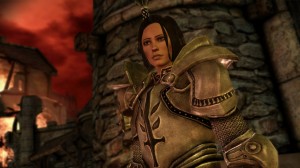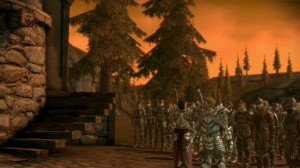I mentioned in a previous post how pleased I was to see that I could instruct my companion in SWTOR to toddle off and sell all my junk loot in order to keep my limited inventory space clear for more important items, such as my fifteenth cosmetic neckerchief – this one will look simply darling in any medium-to-long range combat situation. Of course I imagine that Force users don’t instruct so much as persuade, in what is apparently the Jedi/Sith equivalent of sudo make me a sandwich. I mean, I’d make a rubbish Jedi, because the potential for Force abuse would be far too tempting to resist:
Companion: “But my favourite is green!”
Jedi [making a hand movement]: “Your favourite is yellow.”
Companion: “But my favourite is yellow!”
Jedi: “Well gosh, that *is* most conveniently handy, because that means you can have the yellow wine gums, and I’ll have all the green ones – which are my favourite.”
Companion: “Yay!”
Jedi [makes a subtle hand movement]
Companion: “Ow! Damnit!”
Jedi: “The phantom knicker-elastic snapper again?”
Companion: “It’s, like, every time we’re on the ship.”
Jedi: “It really is most perplexing.”
Companion: “And then there are all those draughts that keep lifting my dress. But we’re on a ship, Jedi! In the vacuum of space! IT’S A VACUUM!”
Jedi: “It is a *terrible* mystery. Truly it is. *monch* *monch* Mmmm, these green wine gums really are delicious.”
In my fresh play through of Skyrim as well, I quickly decided that I will skip the insane levels of inventory juggling and trips to the shops to sell my leftover loot, and instead I would only collect items which would really improve my character immediately, along with any gold coins I stumbled upon.
This is no revelation, just a simple hop skip and a jump along the natural progression of ‘loot leaving’ in an RPG. At first you leave no item unyoinked, twigs, bits of frayed string, fish bones, odd socks, cabbage leaves, cat hairballs, those waffle makers that everyone buys and only ever use once. Heck, it takes half an hour to progress a yard down the first path you encounter while you collect every piece of gravel along the way. After a while you make some money –because in EVERY RPG you start out with no money whatsoever– and you start to feel a little more flush, so that you only feel the need to, say, pick up every other Marmite jar. And you manage to pretty much leave the empty ones alone entirely! A little further in your progress down the Road of Single Player RPG, you find that the weapons and armour your opponents drop are hardly worth enough to warrant collecting, and you barely even look twice at old toenail clippings any more. Yet more time invested sees you leaving even some magical items, recoiling at the thought of having to break off from adventuring in order to traipse all the way back to town to sell them. And it’s not like you’re desperate for the gold now – a little more gold and you can probably buy that really nice castle down by the lake, with the hot tub and the billiard room. You know you’re over the hill of progression and coasting down the other side towards the retirement village of Dunitallnow upon Sea when you start to leave any item that isn’t a legendary artefact, and even then you have to think twice before popping the Holy Invincible Fist of the Almighty into you backpack in order to see if someone will give you some money for it; possibly enough to buy a new gold and diamond pull-chain for your en suite toilet back at the castle. In the end you reach the point where you’re so rich you just abandon cavernous rooms full of wondrous treasure, and when kings offer you dominion over entire regions of their kingdom, you sniff haughtily and give them such a look, as though they’d just rubbed themselves all over with dog poo and asked for a hug.
And yet, despite being so rich that I could buy the moon and still not have enough real estate to store all my worldly (and moonly) possessions, I *still* can’t walk past a blarmed wardrobe and dresser without having a peak inside, just in case. Just in case?! Just in case what? Just in case this mangled camphor box –inside a decrepit old woman’s rundown house– has, amongst the mouldy long knickers, scarves and the top half of a set of false teeth, the Inevitable Sword of Impossible Greatness? A weapon which could cleave the planet in twain and complete my dominion of time and space! Unlikely as that is, it might be hidden there, I’ll just have a peak… “ah no, it’s just some mouldy long knickers and a dusty long pink rubbery… is that a… ?! A…?! Aaaa…aaahhh! Oh, ugh, I think it is! Ewww! Ewww! I think I touched it!” And then I have to spend the next five minutes flapping around the place, holding my hands as far away from the rest of me as possible, while looking for some soap and running water. Such are the hazards of the ever-looting RPG adventurer.
But why this compulsion to look for that next improbably powerful item on the Fantasy Top 100 Items That Could Destroy A World? I mean, if it can cleave a world in twain, is that good? Can you cleave too much? Can you have too much cleavage? If it has a thirty six times direct damage modifier when cleaving, do I really need that? In RPG terms that would be 36DD Cleavage, and I’ve just no idea if I could even handle something of that magnitude.
In the end, I know who to blame: for, every time I get the urge to search for loot, the devil of temptation and the angel of abstinence are to be found, sat upon either shoulder, giving me advice. The devil whispers in my ear “Go on, loot it, looooot it; you know you want to”. A sweat breaks out on my brow, my hand hovers over the loot key, but with a wince I draw my hand sharply back as though the keys were brands which would burn ‘inveterate looter’ onto my finertips for all to see. I turn with great effort to the angel of abstinence who looks upon me with kind eyes full of understanding. Steepling her hands in front of her mouth, she looks thoughtful for a brief moment, and then shouts “For God’s sake man, what are you waiting for?! Loot the damn handbag, there could be some amazing treasure in there!”
Stupid angel of abstinence.

